Gold price is still rising and is now close to the invalidation point for the main Elliott wave count. All three Elliott wave counts remain valid at this stage, but we may soon be closer to some clarity regarding this B wave.
Summary: A high may come soon now for Gold.
If price continues higher to make a new high reasonably above 1,365.68, then only the very bullish Elliott wave count would remain valid.
If price reaches about 1,365.68 and then turns sharply, the double zigzag wave count will remain valid.
Grand SuperCycle analysis is here.
Last monthly charts are here. Video is here.
MAIN ELLIOTT WAVE COUNT
WEEKLY CHART – TRIANGLE
The basic Elliott wave structure is five waves up followed by three waves back (in a bull market). At this time, the preferred Elliott wave count sees Gold as still within three waves back, which began at the all time high in September 2011.
Five waves up are labelled 1,2,3,4,5. Three waves back are labelled A,B,C.
This wave count sees Gold as now about two thirds through the three waves back. The three wave structure is labelled cycle waves a, b and c.
The triangle for cycle wave b may be complete. Primary wave E may have ended almost right at the A-C trend line. If it continues higher, then primary wave E may not move beyond the end of primary wave C above 1,365.68.
Draw a channel about the zigzag of primary wave E using Elliott’s technique. Draw the first trend line from the start of intermediate wave (A) to the end of intermediate wave (B), then place a parallel copy on the end of intermediate wave (A). A breach of the channel by downwards movement would be a strong indication that the triangle for cycle wave b is over and cycle wave c downwards may then be underway.
DAILY CHART – TRIANGLE
Primary wave E must subdivide as a zigzag. Within the zigzag, intermediate wave (C) must subdivide as a five wave structure. Intermediate wave (C) may be over at last week’s high.
A best fit channel is drawn about the impulse of intermediate wave (C). A breach of this channel by downwards movement would be a strong indication that intermediate wave (C) should be over.
A new low now below 1,288.37 would add confidence in this wave count. At that stage, the alternate daily count below would be invalidated.
Within intermediate wave (C), minor wave 2 is still seen as a zigzag and now minor wave 4 is seen as a running contracting triangle (its subdivisions are shown on the hourly chart below). Minor wave 5 would reach equality in length with minor wave 1 at about 1,362.
When triangles complete for Gold, the resulting movement out of them usually begins with some strength.
HOURLY CHART – TRIANGLE
Minor wave 4 fits as a running contracting triangle.
Minor wave 5 must subdivide as a five wave structure, which may be almost complete. Within minor wave 5, minute wave iv may not move into minute wave i price territory below 1,350.49.
When minor wave 5 may be complete, then this wave count expects a sharp reversal.
WEEKLY CHART – DOUBLE ZIGZAG
This wave count is identical to the first weekly chart up to the low labelled cycle wave a. Thereafter, a different Elliott wave corrective structure is considered for cycle wave b.
It is possible that cycle wave b may be an incomplete double zigzag or a double combination.
The first zigzag in the double is labelled primary wave W. This has a good fit.
The double may be joined by a corrective structure in the opposite direction, a triangle labelled primary wave X. The triangle may be incomplete.
Within multiples, X waves are almost always zigzags and rarely triangles. Within the possible triangle of primary wave X, it is intermediate wave (B) that is a multiple; this is acceptable, but note this is not the most common triangle sub-wave to subdivide as a multiple. These two points reduce the probability of this wave count in terms of Elliott wave.
Intermediate wave (D) of a contracting triangle may not move beyond the end of intermediate wave (B) above 1,365.68.
Intermediate wave (D) of a barrier triangle may end about the same level as intermediate wave (B); as long as the (B)-(D) trend line remains essentially flat the triangle will remain valid. This is the only Elliott wave rule that is not black and white. In practice, intermediate wave (D) may end slightly above intermediate wave (B) at 1,365.68 and this wave count would remain valid.
Primary wave Y would most likely be a zigzag because primary wave X would be shallow; double zigzags normally have relatively shallow X waves.
Primary wave Y may also be a flat correction if cycle wave b is a double combination, but combinations normally have deep X waves. This would be less likely.
This wave count has good proportions and no problems in terms of subdivisions.
ALTERNATE ELLIOTT WAVE COUNT
WEEKLY CHART
This wave count sees the three waves back now complete at the last major low for Gold in November 2019.
If Gold is in a new bull market, then it should begin with a five wave structure upwards on the weekly chart. However, the biggest problem with this wave count is the structure labelled cycle wave I because this wave count must see it as a five wave structure, but it looks more like a three wave structure.
Commodities often exhibit swift strong fifth waves that force the fourth wave corrections coming just prior and just after to be more brief and shallow than their counterpart second waves. It is unusual for a commodity to exhibit a quick second wave and a more time consuming fourth wave, and this is how cycle wave I is labelled. The probability of this wave count is low due to this problem.
Cycle wave II subdivides well as a double combination: zigzag – X – expanded flat.
Cycle wave III may have begun. Within cycle wave III, primary waves 1 and 2 may now be complete. If it continues lower as a double zigzag, then primary wave 2 may not move beyond the start of primary wave 1 below 1,160.75.
Cycle wave III so far for this wave count would have been underway now for 44 weeks. It may be beginning to exhibit some support from volume and increasing ATR. If this increase continues, then this wave count would have some support from technical analysis.
There is very strong resistance here in a zone from 1,345 to 1,375. This wave count now expects an upwards breakout above 1,375, which should have support from volume. While an upwards breakout has not happened, this wave count will continue to have a low probability.
TECHNICAL ANALYSIS
WEEKLY CHART
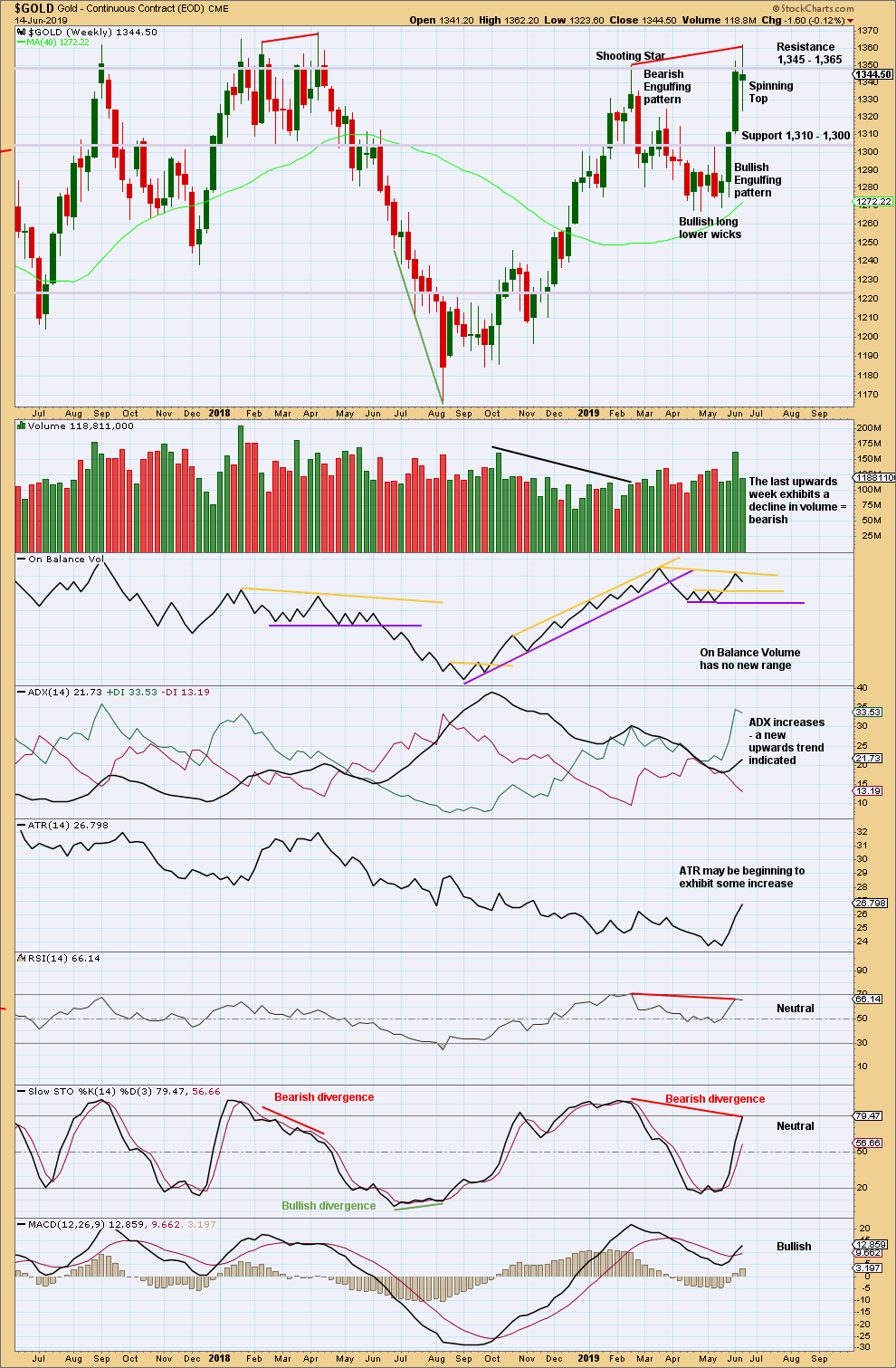
Click chart to enlarge. Chart courtesy of StockCharts.com.
At the last few major highs for Gold (on weeks of 5th July 2016, 5th September 2017, 9th April 2018 and 19th February 2019) the following points are noted:
– Volume was not the strongest for the last upwards week. Some decline in volume accompanied the final high.
– Bearish divergence was seen between price and Stochastics in only two of four of the identified major highs.
– Bearish divergence was seen between price and RSI in only one of four of the identified major highs.
Last week there is bearish divergence between price and Stochastics, and price and RSI after RSI reached overbought. There is also now a final upwards week that exhibits a strong decline in volume. It looks like there is more likely to be a high in place.
The Spinning Top candlestick pattern on its own is not a reversal signal. It is neutral and represents indecision.
DAILY CHART
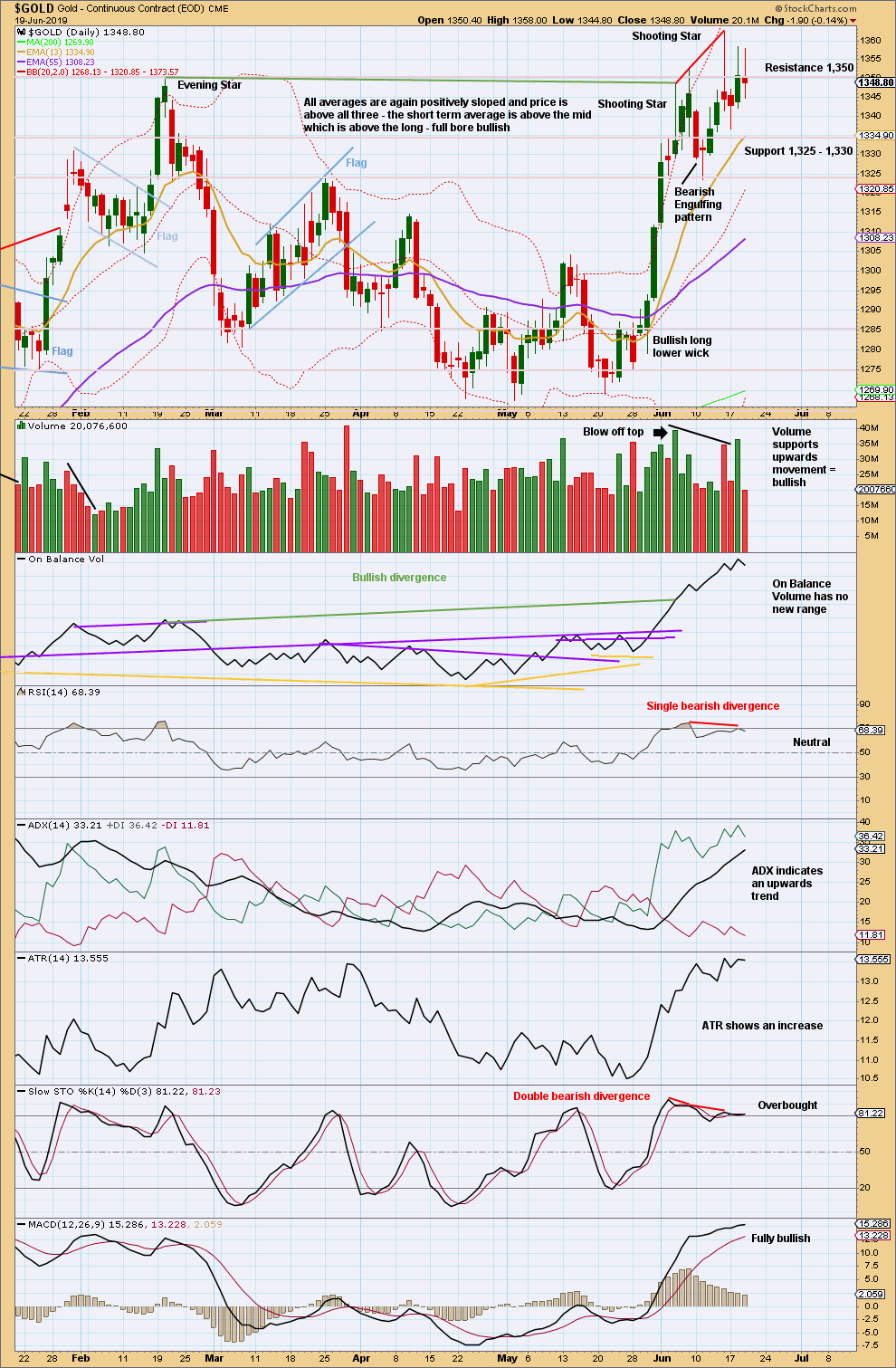
Click chart to enlarge. Chart courtesy of StockCharts.com.
After the close of the New York session, Gold has moved higher to make a new high above the prior high on the 14th of June 2019. This may be shown in the next daily candlestick from StockCharts.
There is an upwards trend which has short-term support from volume. RSI and Stochastics have both reached extreme and then exhibited divergence with price; this often happens about major trend changes and that should still be a possibility to look out for. However, there is as yet no evidence of a trend change at this stage.
GDX WEEKLY CHART
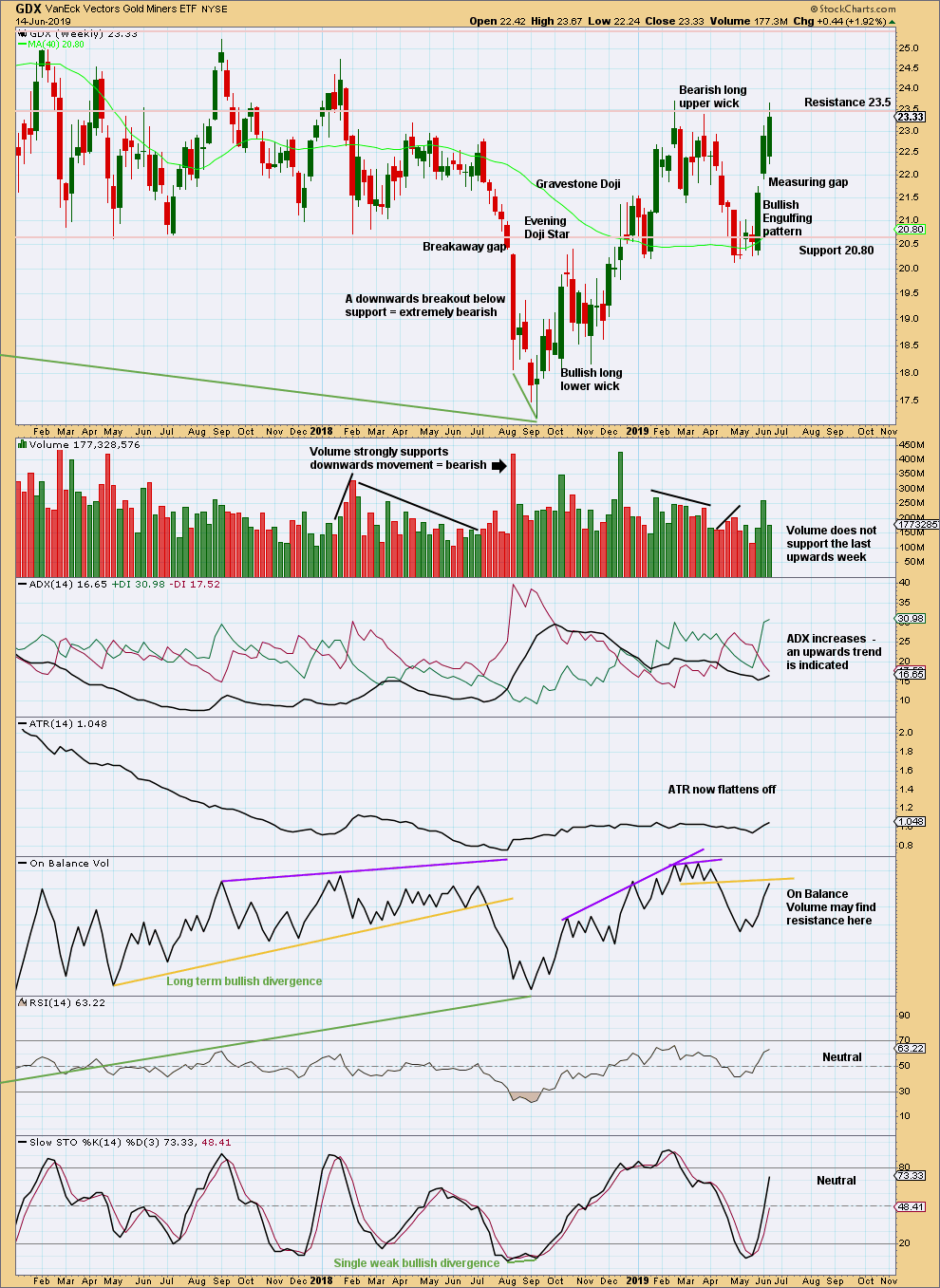
Click chart to enlarge. Chart courtesy of StockCharts.com.
Some decline in volume last week is slightly bearish, but not enough for expect a high here for GDX. Assume an upwards trend remains until proven otherwise.
GDX DAILY CHART
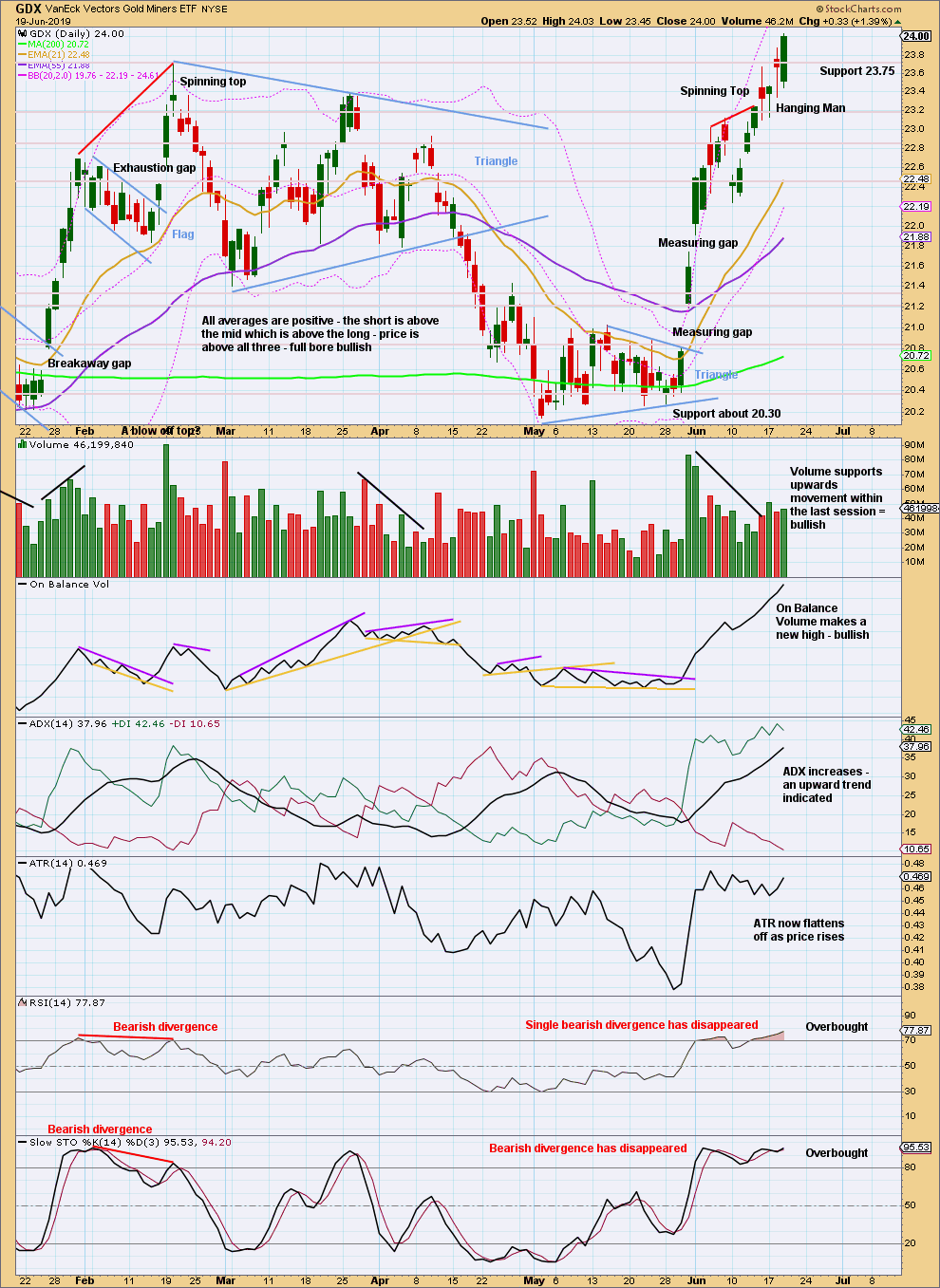
Click chart to enlarge. Chart courtesy of StockCharts.com.
The last measuring gap may now provide support. It may remain open at 21.74.
An upwards trend is in place. Assume it will continue until proven otherwise. Today there is still no evidence of a trend change for GDX.
Published @ 6:06 p.m. EST.
—
Careful risk management protects your trading account(s).
Follow my two Golden Rules:
1. Always trade with stops.
2. Risk only 1-5% of equity on any one trade.
—
New updates to this analysis are in bold.

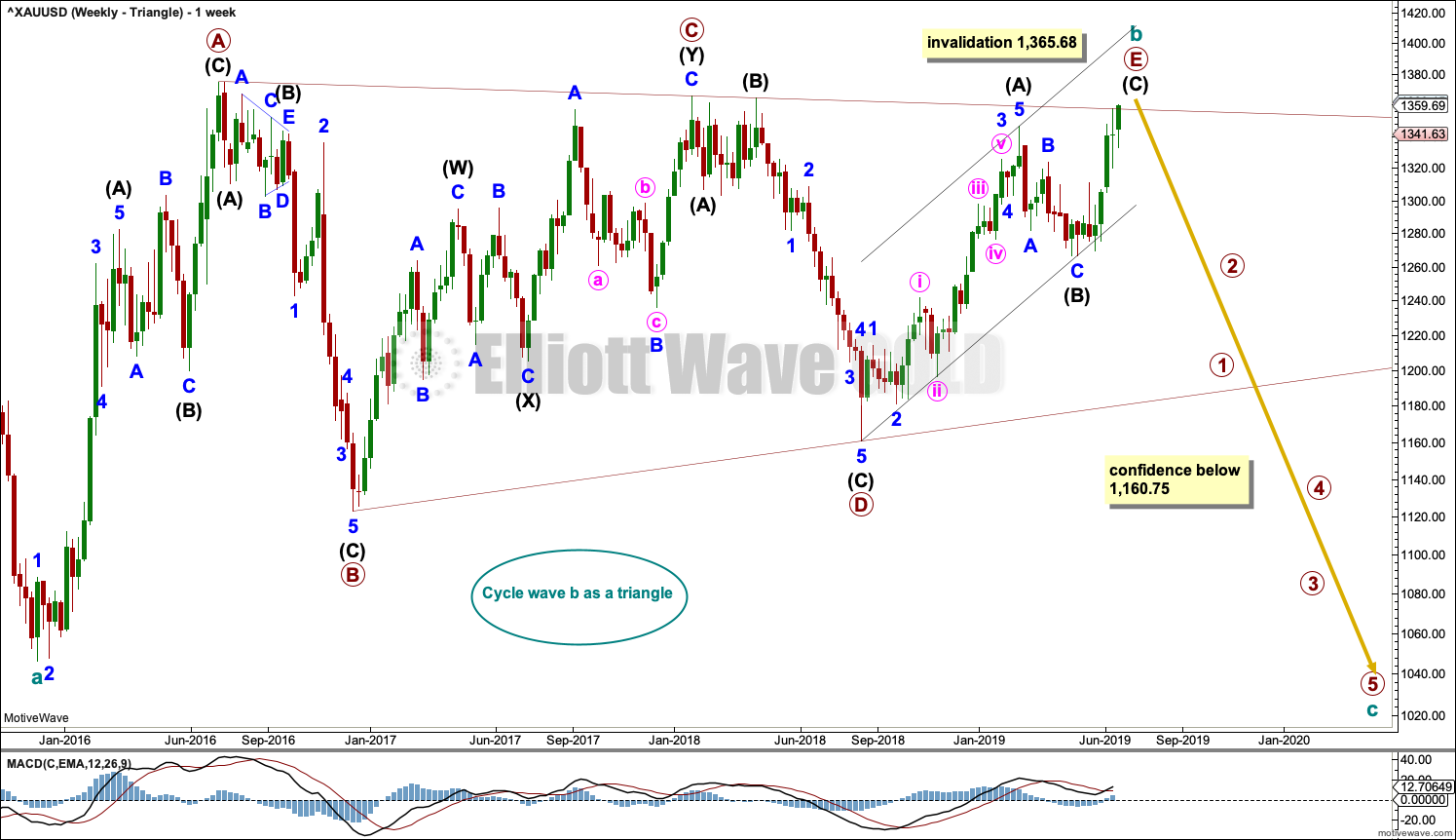
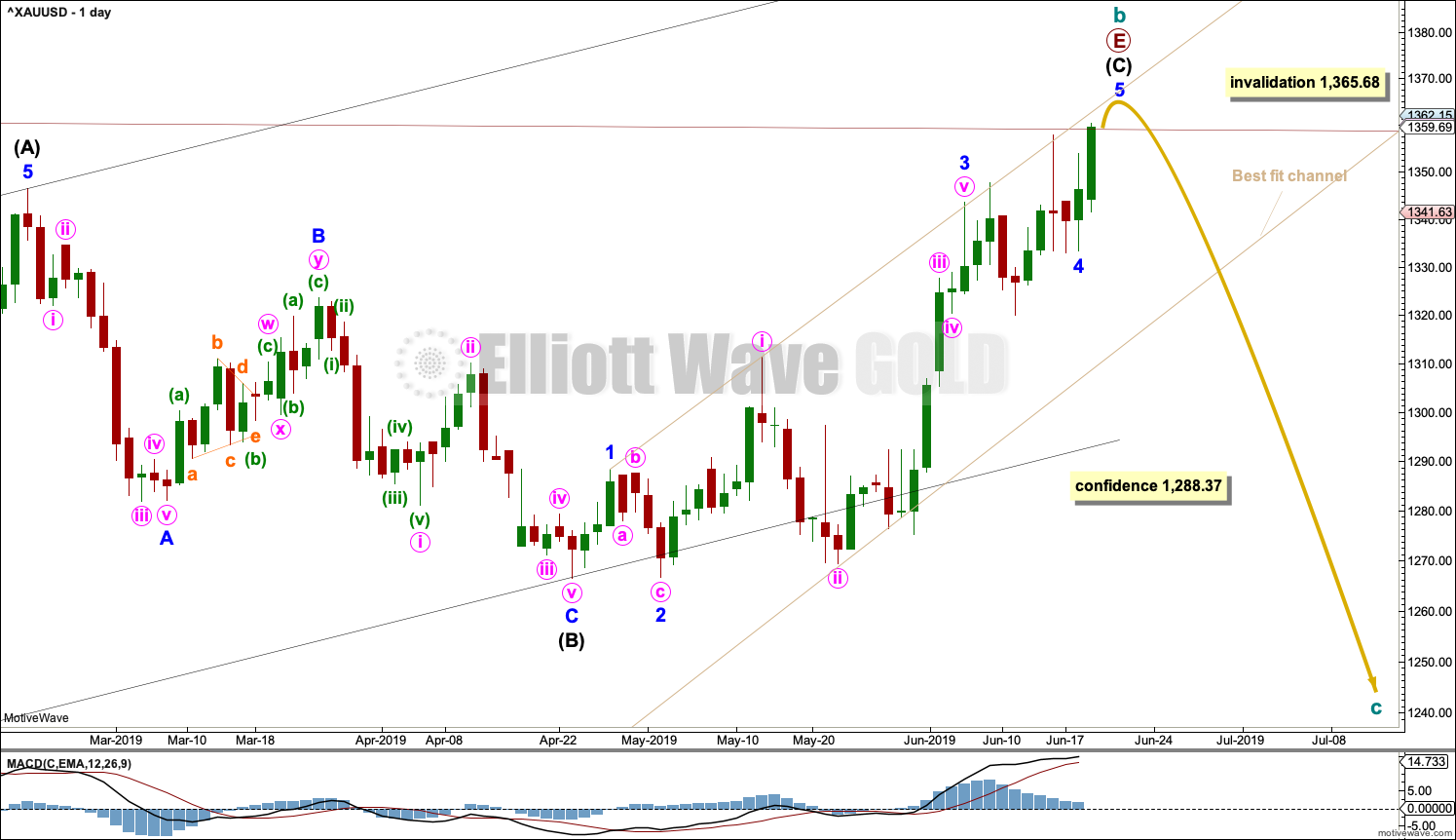
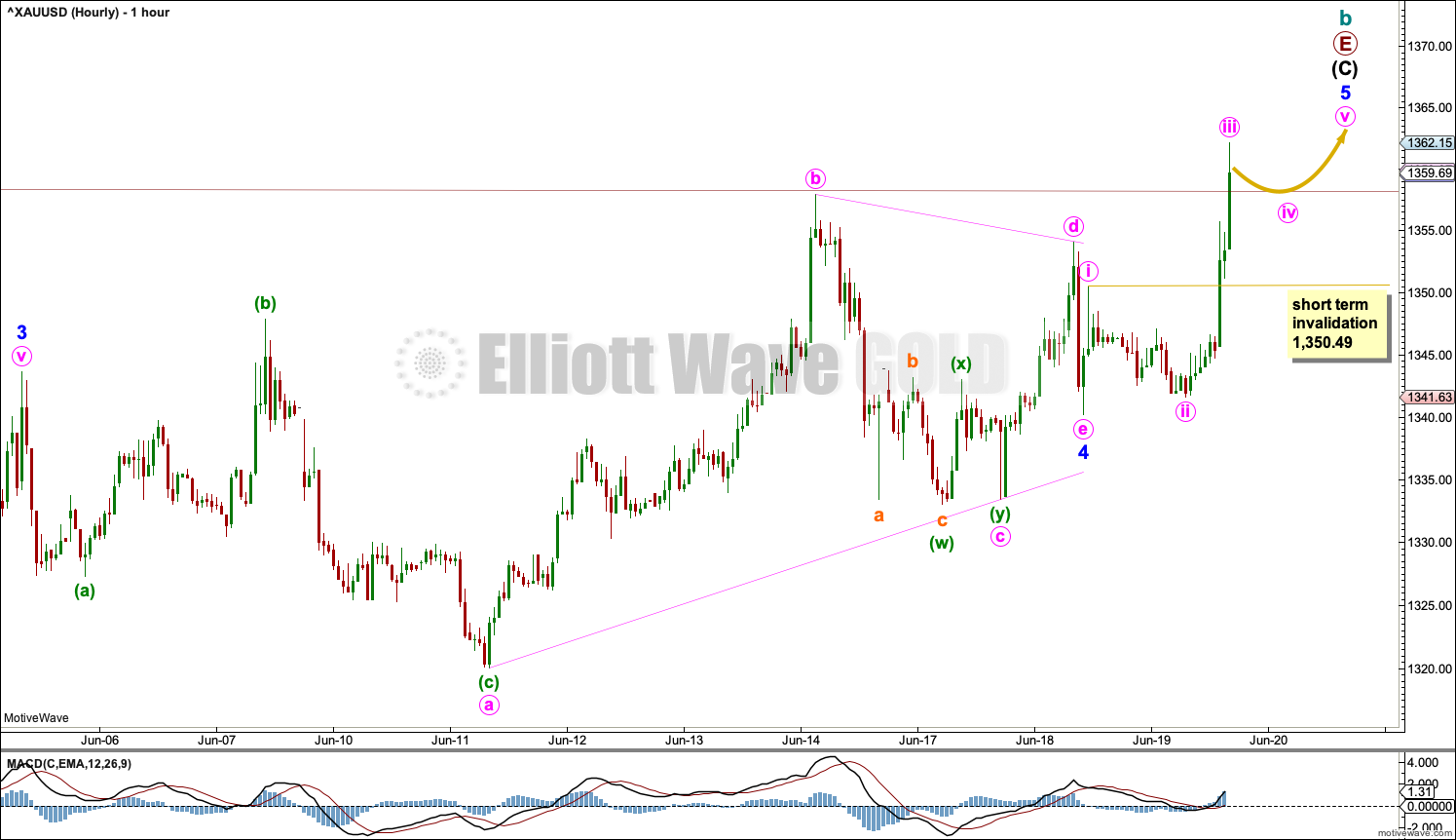
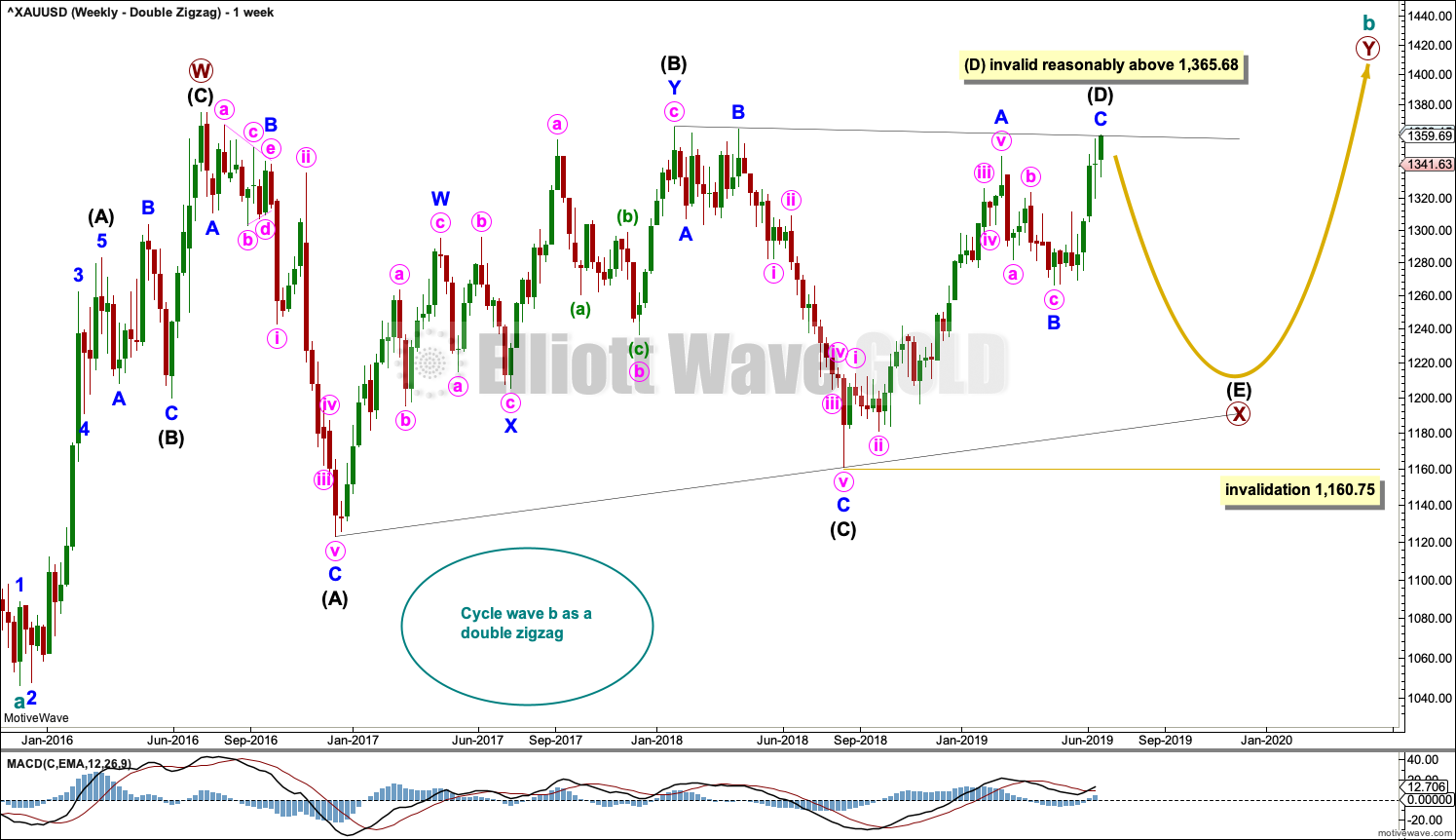
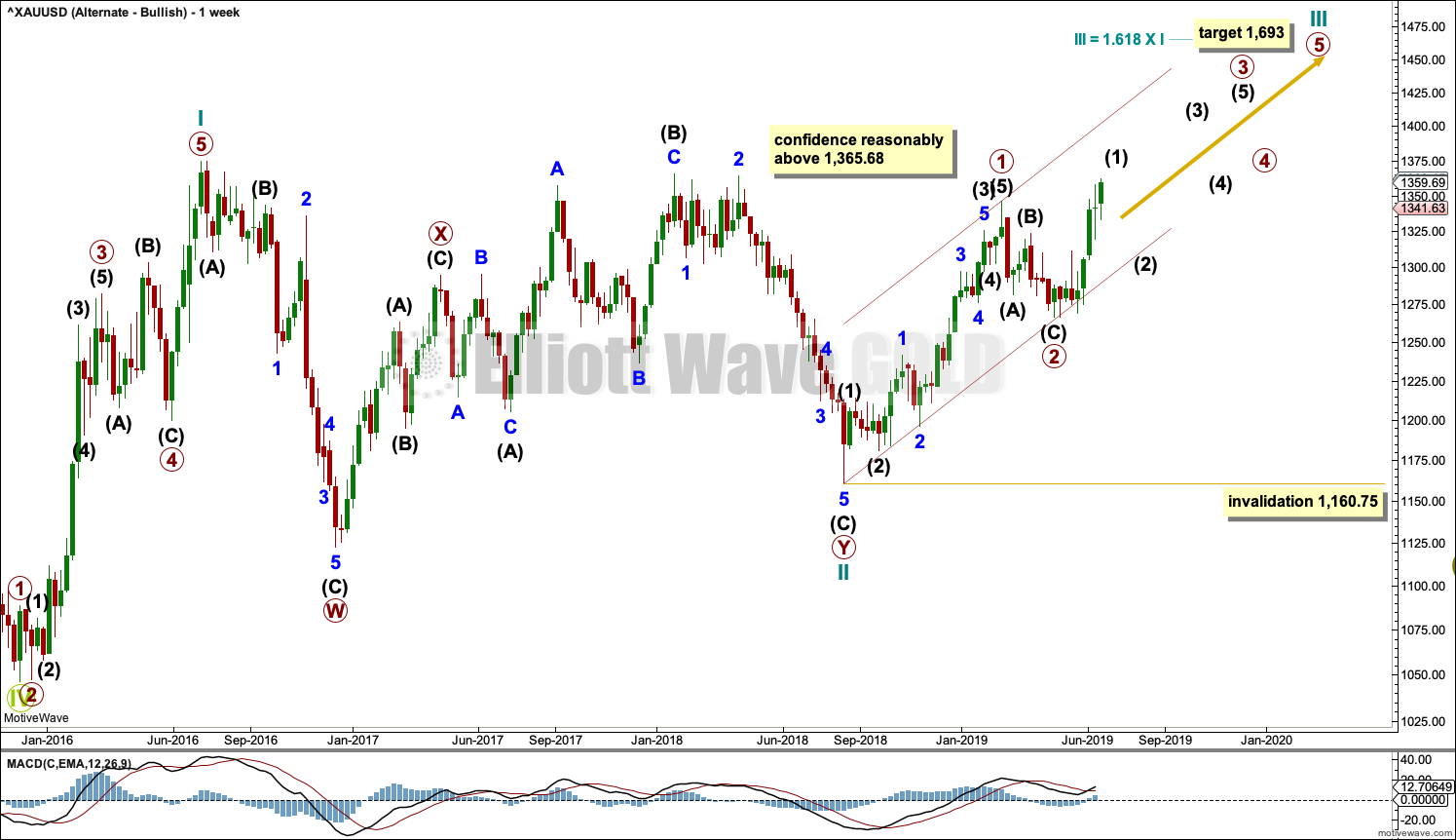
I’m updating Gold now. To be published shortly.
The short message though is; the main count is invalidated, the alternate bullish count has some confidence now. Or at least, Gold has proven itself bullish for the short to mid term.
This is an upwards trend and now we have an upwards breakout today from a multi year consolidation. I expect it will be with volume to support the breakout.
After upwards breakouts it is typical to see price curve down and test support at prior resistance. Waiting for that test for an entry can often prove profitable.
Perfect – obviously desperate to hear where you think that support lies.
meh, my bet is that the bear market was over in 2015 and now we are in the third way up, a corection to follow and the third of the third will come 🙂
Gold is like a rocket…yay!!
Another valid option? Bullish, but not a wave 5 up to new highs
May be Lara should update . Your count sounds great. I am still not expert but like EW analysis.
That could work also.
Primary A would have to be seen as a five if cycle b is A-B-C, a zigzag.
It would be better labelled W-X-Y, but now X is a multiple (that’s the only way that works). Will chart and publish.
where u label cycle a Lara has Gran super wave IV complete in bullish count. The upward channel and explosion to above $1377 Nov 2016 price may indicate alternate bullish count may be in play. IMO
Only bullish count remains. All other counts invalidated????
Gold cloaked 1394 high.
yep.
Asking Lara for hourly daily counts on bull chart.
when the session is closed I’ll have an hourly chart for you along with TA
See chart
What’s reasonably above?
Still chance of a fake out?
Touched highs, but so far, only very briefly
In a barrier triangle, the B-D trendline needs to basically look flat, so D might be a couple of points above B and still appear flat. Price has moved well above the point where the B-D trendline could still appear flat. Hope that helps.
It appears we are going higher for sure, but there will still be more than one bullish option. Lara will need to prioritize the new options.
Lara, is Intermediate wave 1 almost complete for your alternate count, which will likely now be your main count?
Wow 😮 Gold liked the dovish Fed and the possibility of rate drop(s) this year 🚀